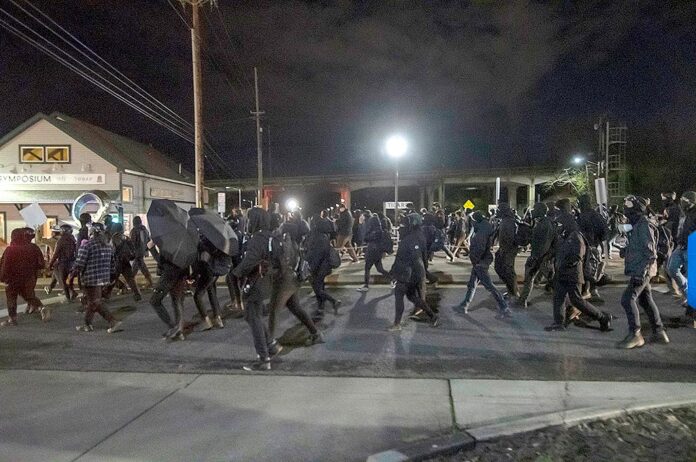
After Tigard Police officers shot dead a man reportedly experiencing a mental health crisis Wednesday night, protesters took to the streets the following night and caused property damage to the Tigard Police Station and City Hall, and an array of businesses on Main Street in downtown Tigard.
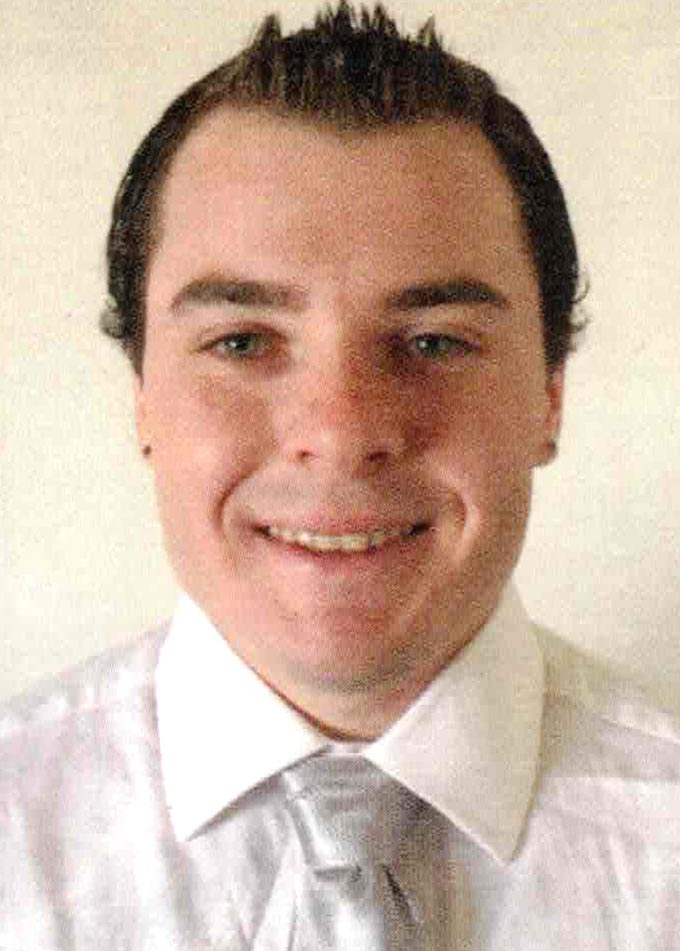
According to Tigard Police, Jacob Ryan Macduff, 26, was killed by police gunfire Wednesday as he sat in his pickup truck in an apartment complex near Southwest Hall Boulevard and Southwest Bonita Road in Tigard. Police said Macduff was being sought on domestic violence related charges, armed with a knife and actively resisting arrest at the time he was killed.
Tigard Police have identified the officer who fired the fatal shots as 14-year veteran Gabriel Maldonado. Four other officers, including a negotiator and a Sergeant were also at the scene.
Tigard Police Chief Kathy McAlpine said Monday officers did “develop probable cause for domestic violence,” but offered few additional details.
“They encountered Mr. Macduff in his vehicle, on the apartment premises, during which time the events led there to one of our officers shot and killed Jacob Macduff,” McAlpine said at a meeting of the City’s brand-new Public Safety Advisory Board. “We rendered aid, we asked for a Lifeflight, only to have Mr. Macduff deceased at the scene.”
Others in the local community, however, are challenging the initial description of events and said that Macduff had been having mental health issues over the past several days leading up to the shooting. This includes a detailed account given by Macduff’s roommate, Theresa Chapin, who told Tigard Life that Macduff had been in crisis for several days leading up to his death.
Chapin said she called police five times in three days, each time asking for assistance or resources to help get Macduff mental health care.
“I kept calling on the emergency line to see if they would take him for a mental hold,” she said. “They gave me no resources, no hotline numbers.”

This led to Jan. 6, when Chapin was at her apartment and heard Macduff enter the home. She described him as being in a full manic episode, something that had happened with increasing frequency after he stopped taking medication for his condition roughly nine months earlier. He began bashing his head against the wall.
At this point, she said, she didn’t think she would get any help from police by calling again, but her neighbors heard the commotion and called 911.
“So, on this day it went through as a domestic violence call,” Chapin said. “My neighbor told them she was worried about his mental health.”
She told responding officers Macduff was in his truck downstairs and asked them again for mental health resources. She says police told her they couldn’t do that because Macduff was “a criminal.”
Macduff’s truck was parked on the opposite side of the building from Chapin’s apartment at the very end of the building.
“Around the corner where his truck was parked, it’s very close to the unit,” she said. “We didn’t hear anything, no communications, we didn’t hear them talking to him. I told them ‘Look, he’s in an episode, I’m the only one who can talk to him. I told them ‘I’m not a victim, let me talk to him.’”
Less than 10 minutes later Chapin said she heard the first five gunshots. She ran off her balcony but was grabbed by a co-worker with her who told her not to go outside or she might also be shot.
“30 seconds later, five more shots,” she said. “Did you wait to see if he moved and decide to finish him off? Did you get tired of responding to my house? How did you guys possibly fail him so much?”
She said the sounds of gunfire breaking glass make her think that the windows to Macduff’s vehicle were closed at the time he was shot. She also said the knife he is said to have had was likely a small Swiss Army pocketknife on Macduff’s keychain – no kitchen knives or other potential weapons were missing from her apartment.
Chapin added that the police response to her repeated requests for help is demoralizing and now makes her fear for her own safety.
“I just feel like if one of those five times in the three days if they had given some kind of paperwork or a crisis hotline that I could have done, Jacob wouldn’t be dead today,” she said. “They completely failed him.”

This was the backdrop for Thursday evening’s events, when a crowd of an estimated 100 or so protesters blocked traffic on Main Street and marched to the Tigard Police Department and Tigard City Hall. Around 8:45 p.m. that evening, a handful of individuals broke an estimated 20 windows and applied anti-police slogans on exterior walls with spray paint. An estimated 10 to 20 business storefronts also had graffiti applied, much of it on top of plywood covering windows and doors, while a window was broken at the American Family Insurance office.
Several minutes after the crowd arrived at the police station, officers from Tigard and the Washington County Mobile Field Force Team, comprised to officers from agencies around the county, responded both on foot and in patrol vehicles and declared the event an unlawful assembly and then a riot. Police threatened the use of chemical and impact munitions as they secured the police station, and this finally caused the crowd to retreat back to Burnham Street and then Main Street.
One individual identified as Zane Saleem Bsoul, 20, no address given, was arrested on a single count of riot in connection with the protest and was lodged in the Washington County Jail. He was later released without bail.
McAlpine said at a press conference Friday that the delayed police response was intended to draw protester attention away from downtown businesses as much as possible.
“We have to strategically decide when and where we can engage this behavior,” she said. “We did want to deter it and not cause any more damage to the downtown corridor that doesn’t deserve this.”
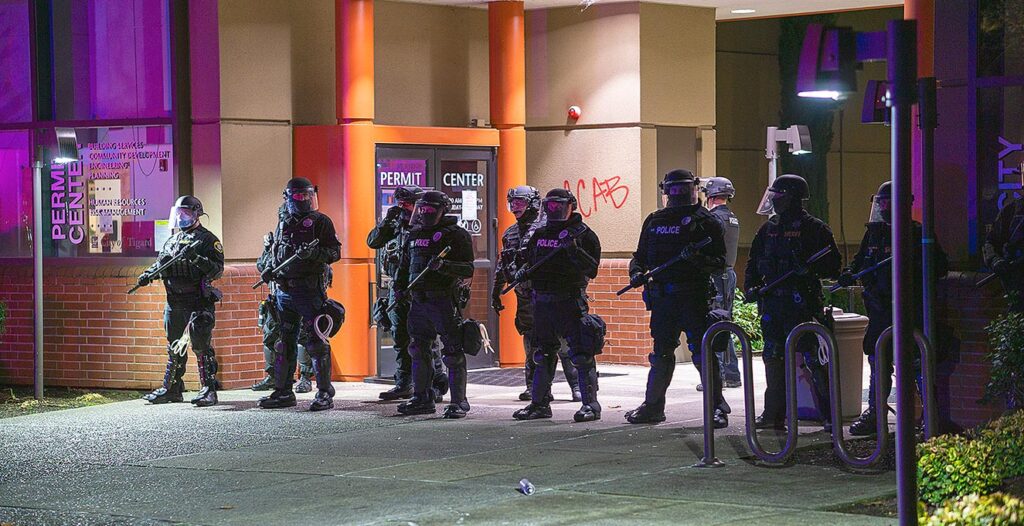
McAlpine offered more detail about the police response Monday at a meeting of the City’s Public Safety Advisory Board and said that police felt they were simply outmanned by the size of the crowd and underequipped for the events that unfolded.
“I don’t want to get into our tactics, there were a lot of decision made as to when we could engage but sending two officers into a crowd of 100 surrounded by motorcycles is a recipe for disaster,” she said.
Some Tigard residents expressed dismay over the protest and resulting damage.
“I would say to the protesters why are you doing this?” said Chris Cach, a Tigard resident who owns property on Main Street that house a string of businesses. “Yes, there was a killing, but does everybody have the correct information? I don’t think so. I don’t see a reason why that has to be a protest, but the way our country is right now everybody has to protest for something now it seems like.”
Word of the protest spread on social media throughout the day, and after a reverse 911 call from police and other notifications, Cach and several other downtown business owners boarded up a number of storefronts before the march started. Graffiti was later sprayed on the plywood covering windows and doors, including one slogan that read “If cops don’t kill, you don’t board up.”
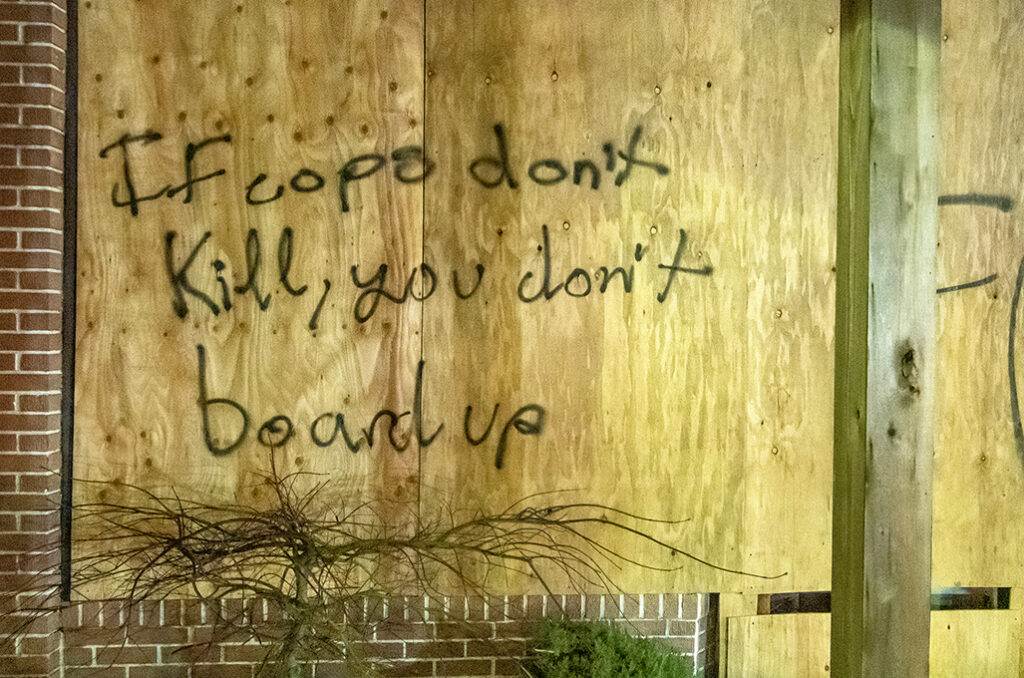
Another Tigard resident, Molly Ryan Murray lives just off of downtown and said protesters harm their own cause by resorting to property damage.
“It truly is a travesty, it really is,” Murray said. “Just for everybody, my neighbors, and obviously the community. It really is jaw dropping. It’s unimaginable and I hope it doesn’t continue.”
McAlpine said Monday she was frustrated by not being able to control the narrative surrounding the initial shooting of Macduff. Social media, she added, helped spark public anger that played out during the protest.
“We had heard it could be up to 1,000 people they were trying to rally, but it was a little over 100, all in black, a motorcycle contingent, scouts deployed all over the place,” she said. “Off they went through downtown toward city hall/police department. On their way they did do some tagging, a few broken windows as they came to us. The important thing is how quickly unfolding it was. Many windows were broken simultaneously, graffiti, lasers to disable our surveillance equipment; all in about two minutes.”
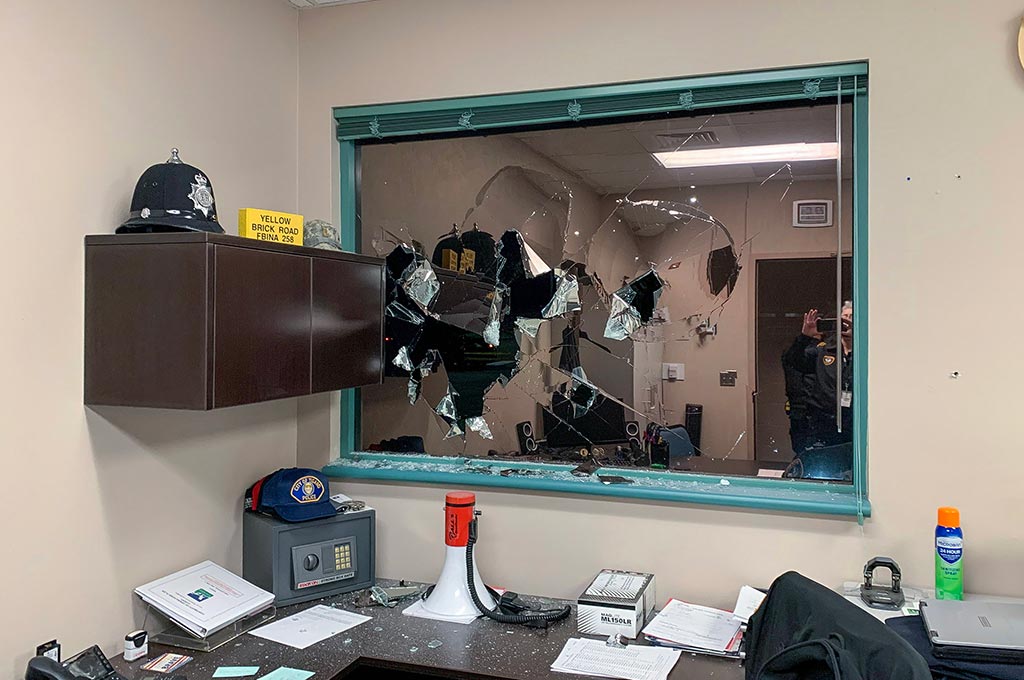
What police did not want, McAlpine added, was for them to gain access to city hall and the police department.
“As soon as that announcement (unlawful assembly) was made and we made our presence known they dispersed pretty quickly,” she said. “We stayed in place for the most part because we feared they could turn around and do a second wave. There never was a second wave so after a couple of hours we began to slowly assess the damage that was done.”
Protesters themselves were largely reluctant to talk about the march on the record, but one Tigard resident, who identified herself as Cyncyrie Cruz, said people who gathered Thursday were outraged by Macduff’s death.
“When I heard about what happened last night, I was distraught,” Cruz said. “Because that could have been me or my husband or someone in my family, because we are all in a mental health crisis right now. Every person has something going on. And if we can’t cry and ask for help without getting shot, then what country do we live in? That’s why I’m here.”
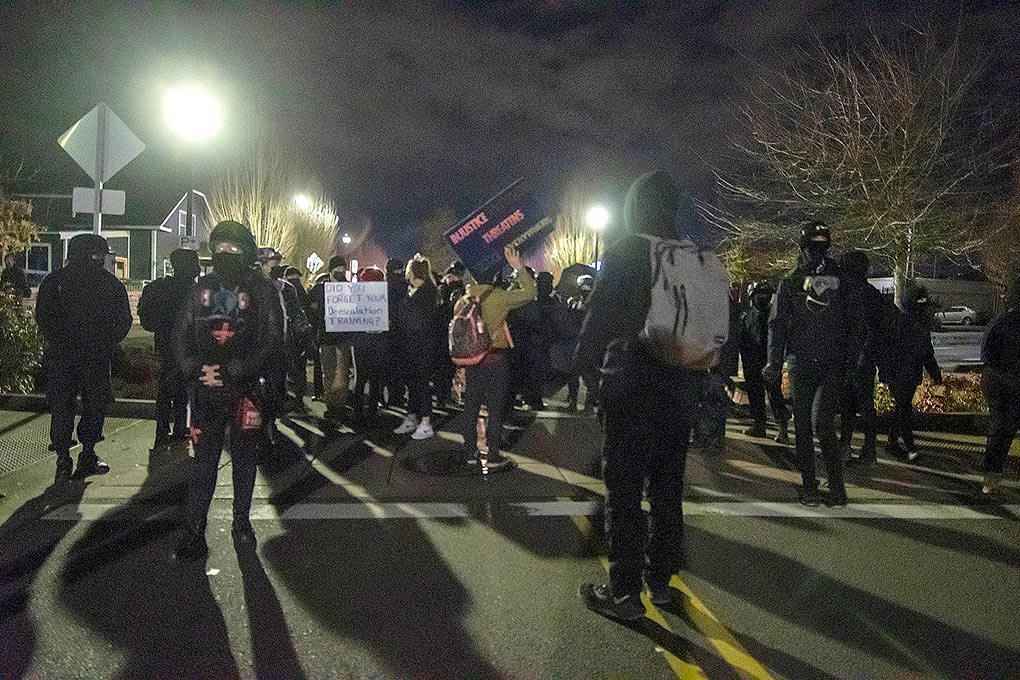
She added that those who knew Macduff and were in close contact with him have confirmed that he was having a mental health crisis leading up to his death.
“I have spoken with people who were there, and with people in the community and it was a mental health crisis,” Cruz said. “The roommate wanted a welfare check and the individual from what I have heard had a knife and he was shot multiple times by police who were fully armed and protected by each other.”
Macduff’s death remains under investigation by the Washington County Major Crimes Team.
The last time Tigard Police were involved in a fatal shooting incident was in 2006, when 18-year-old Lukas Glenn was killed by two Washington County Sheriff’s Deputies who responded with Tigard Police Officer Andrew Pastore to a reported domestic disturbance.





















